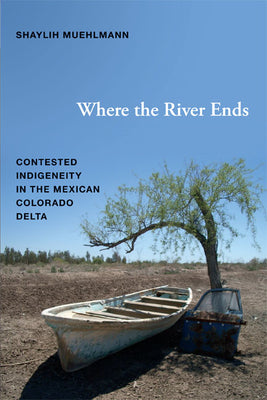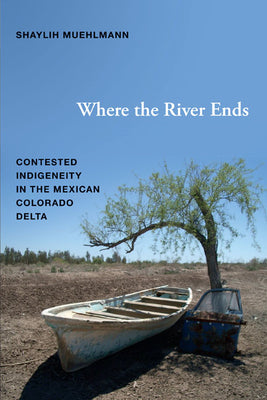
Where the River Ends: Contested Indigeneity in the Mexican Colorado Delta
₡23.700
₡0
Where the River Ends: Contested Indigeneity in the Mexican Colorado Delta
Shaylih Muehlmann
 Where the River Ends: Contested Indigeneity in the Mexican Colorado Delta
Where the River Ends: Contested Indigeneity in the Mexican Colorado Delta
Where the River Ends: Contested Indigeneity in the Mexican Colorado Delta
Shaylih Muehlmann
Descripción
Living in the northwest of Mexico, the Cucapá people have relied on fishing as a means of subsistence for generations, but in the last several decades, that practice has been curtailed by water scarcity and government restrictions. The Colorado River once met the Gulf of California near the village where Shaylih Muehlmann conducted ethnographic research, but now, as a result of a treaty, 90 percent of the water from the Colorado is diverted before it reaches Mexico. The remaining water is increasingly directed to the manufacturing industry in Tijuana and Mexicali. Since 1993, the Mexican government has denied the Cucapá people fishing rights on environmental grounds. While the Cucapá have continued to fish in the Gulf of California, federal inspectors and the Mexican military are pressuring them to stop. The government maintains that the Cucapá are not sufficiently "indigenous" to warrant preferred fishing rights. Like many indigenous people in Mexico, most Cucapá people no longer speak their indigenous language; they are highly integrated into nonindigenous social networks. Where the River Ends is a moving look at how the Cucapá people have experienced and responded to the diversion of the Colorado River and the Mexican state's attempts to regulate the environmental crisis that followed.
Detalles
| Formato | Tapa suave |
| Número de Páginas | 240 |
| Lenguaje | Inglés |
| Editorial | Duke University Press |
| Fecha de Publicación | 2013-05-23 |
| Dimensiones | 9.0" x 5.9" x 0.6" pulgadas |
| Letra Grande | No |
| Con Ilustraciones | Si |
| Temas | Estudios Aborígenes/Nativos, América Latina, Mexicano, Nativo Americano |
Acerca del Autor
Shaylih Muehlmann is Assistant Professor of Anthropology and Canada Research Chair in Language, Culture and the Environment at the University of British Columbia.
Descripción
Living in the northwest of Mexico, the Cucapá people have relied on fishing as a means of subsistence for generations, but in the last several decades, that practice has been curtailed by water scarcity and government restrictions. The Colorado River once met the Gulf of California near the village where Shaylih Muehlmann conducted ethnographic research, but now, as a result of a treaty, 90 percent of the water from the Colorado is diverted before it reaches Mexico. The remaining water is increasingly directed to the manufacturing industry in Tijuana and Mexicali. Since 1993, the Mexican government has denied the Cucapá people fishing rights on environmental grounds. While the Cucapá have continued to fish in the Gulf of California, federal inspectors and the Mexican military are pressuring them to stop. The government maintains that the Cucapá are not sufficiently "indigenous" to warrant preferred fishing rights. Like many indigenous people in Mexico, most Cucapá people no longer speak their indigenous language; they are highly integrated into nonindigenous social networks. Where the River Ends is a moving look at how the Cucapá people have experienced and responded to the diversion of the Colorado River and the Mexican state's attempts to regulate the environmental crisis that followed.
Detalles
| Formato | Tapa dura |
| Número de Páginas | 240 |
| Lenguaje | Inglés |
| Editorial | Duke University Press |
| Fecha de Publicación | 2013-05-23 |
| Dimensiones | 9.0" x 6.0" x 0.56" pulgadas |
| Letra Grande | No |
| Con Ilustraciones | Si |
| Temas | Estudios Aborígenes/Nativos, América Latina, Mexicano, Nativo Americano |
Acerca del Autor
Shaylih Muehlmann is Assistant Professor of Anthropology and Canada Research Chair in Language, Culture and the Environment at the University of British Columbia.
Garantía & Otros
| Garantía: | 30 dias por defectos de fabrica |
| Peso: | 0.485 kg |
| SKU: | 9780822354437 |
| Publicado en Unimart.com: | 01/11/23 |
| Feedback: |
¿Viste un precio más bajo?
Queremos saber.
×
Informános Sobre un Mejor Precio 
Where the River Ends: Contested Indigeneity in the Mexican Colorado Delta ¿Viste un precio más bajo? Queremos saber. Aunque no podemos igualar todos los precios, usaremos tus comentarios para asegurarnos que nuestros precios sean competitivos. ¿Adonde viste un precio más bajo? |
Categorías relacionadas:
×






Where the River Ends: Contested Indigeneity in the Mexican Colorado Delta







